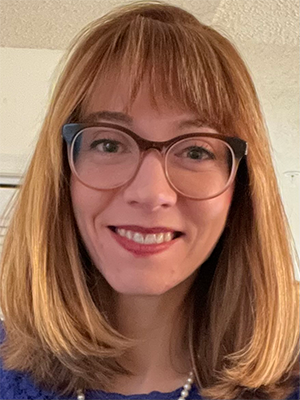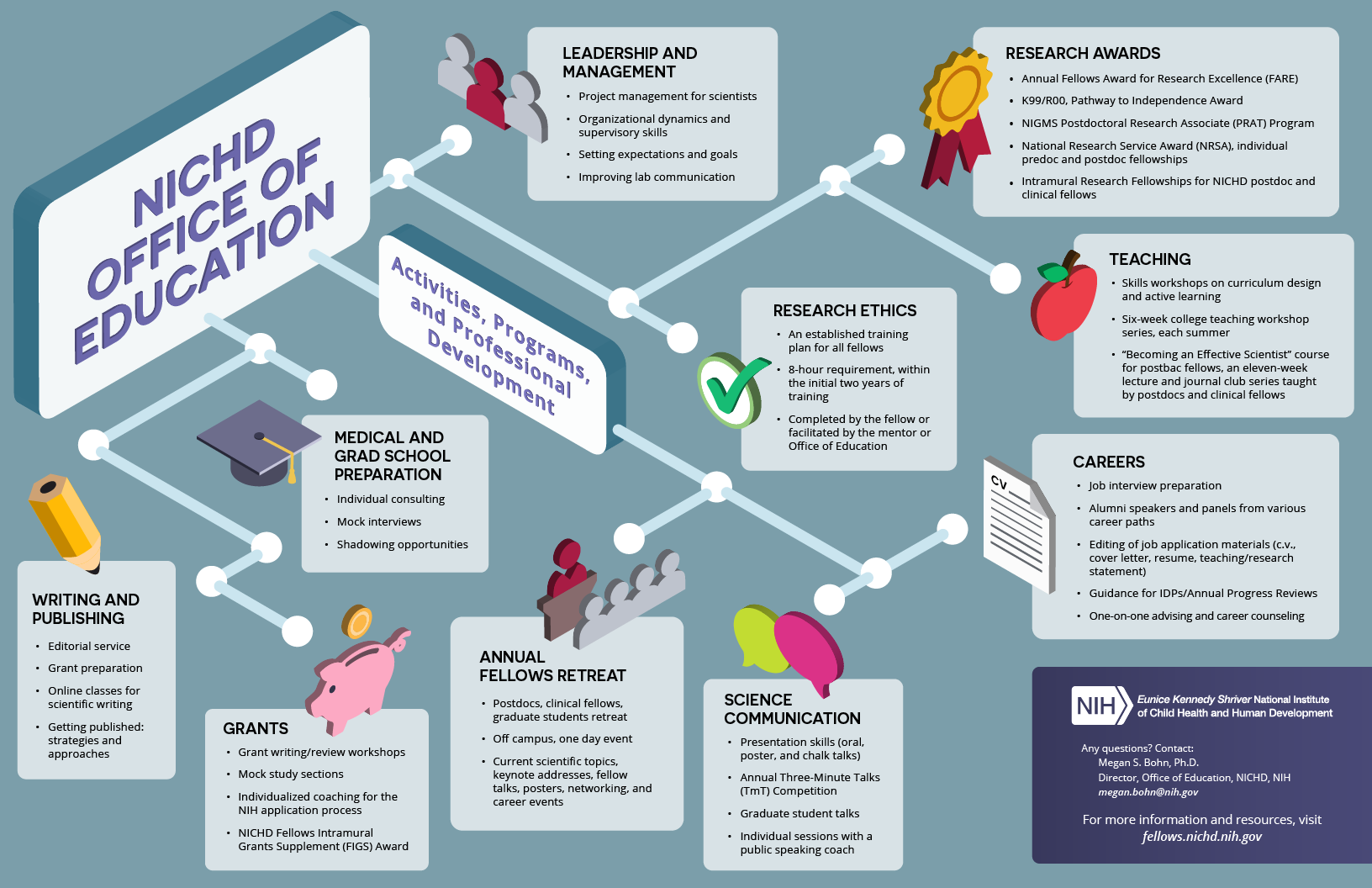Office of Education
- Erin Walsh,
PhD, Deputy Scientific Director for Science Program Management - Megan Bohn, PhD, Training Director
- Katherine Lamb, Program Coordinator
- Veronica Harker, Program Coordinator
- Sally Chang, MA, PhD, Bioinformatics Training Program Manager

The goals and objectives of the Office of Education (OE) can be summarized as follows: to meet the training needs of intramural scientists, fellows, and students at all levels, the Office of Education recruits and develops academic support programs, contributes to mentoring, evaluation, and career guidance, and creates new training initiatives. Our professional development workshops and activities typically include public-speaking workshops, job interviewing, writing and editorial services for professional school and job applications, grantsmanship workshops, academic and non-academic career presentations, one-on-one counseling, teaching opportunities, and lab-management programs. Additional areas of involvement include programming for career exploration, networking among fellows and alumni, grantsmanship, and the enhancement of fellows’ competitiveness for research awards and future career opportunities, as well as support of tenure-track investigators.
Office of Education Staff
Left to right: Erin Walsh, PhD, Deputy Scientific Director for Science Program Management; Megan Bohn, PhD, Training Director; Katherine Lamb, Program Coordinator; Veronica Harker, Program Coordinator; E. Sally Chang, MA, PhD, Bioinformatics Training Program Manager
Office of Education Staff
Left to right: Erin Walsh, PhD, Deputy Scientific Director for Science Program Management; Megan Bohn, PhD, Training Director; Katherine Lamb, Program Coordinator; Veronica Harker, Program Coordinator; E. Sally Chang, MA, PhD, Bioinformatics Training Program Manager
Notable accomplishments of the past year
The Office of Education organizes numerous workshops, programs, and individualized opportunities for a population averaging 300 trainees, including: postdoctoral, visiting, and research fellows; clinical fellows and medical students; graduate students; and postbaccalaureate fellows and summer interns.
Our TmT (Three-minute Talks) competition, now in its tenth year, was held in conjunction with twelve other institutes: NCATS, NEI, NIAID, NIAMS, NIDCD, NIDCR, NIDDK, NIEHS, NINDS, NHGRI, NHLBI, and NLM. Elena Evans, postbaccalaureate fellow in the Section on Genetic Disorders of Bone and Extracellular Matrix, was the NICHD finalist and competed in the NIH–wide competition.
We continued our Graduate Student Talks initiative, established in 2014, which provides the Institute's graduate students with experience in presenting their thesis research to a non-specialist scientific audience.
An online Annual Progress Review for fellows, developed by the Office and launched in 2016, tracks scientific and career development and progress. As part of the assessments of investigators' mentoring, the reports are analyzed and provided to the site visits of the Board of Scientific Counselors. A new Individual Development Plan and Annual Progress Report system for intramural postbaccalaureate fellows, which was implemented in October 2023, has completed its first year.
In September 2024, the Division of Intramural Research (DIR) gave its Mentor of the Year awards to Miranda Marvel, staff scientist in the Section on Vertebrate Organogenesis, for the investigator category; and to Anna Senft, a postdoctoral fellow in the Section on Mammalian Development and Evolution, for the fellow category.
The DIR Fellows’ Exit Survey was established in summer 2022 and is actively collecting data on trainee-experience feedback and career outcomes, and also serves as an alumni database.
We compiled a valuable list of organizations that accept grant applications from NIH intramural fellows, through both NIH and non–NIH funding mechanisms. It can be found on the NICHD fellows' wiki site. In FY24, two DIR postdoctoral fellows were awarded the competitive NIH K99/Pathway to Independence Award. Also, for NICHD, 15 Fellows Award for Research Excellence (FARE) awards were made for the 2024 (FY25) competition.
The Fellows Intramural Grants Supplement (FIGS) continues to recognize and stimulate grant applications among fellows. We launched the 8th cycle for our Intramural Research Fellowships (IRFs), an ongoing competitive internal funding opportunity for NICHD postdoctoral and clinical fellows. Its ultimate goal is to promote fellows' grant writing and to enhance their awareness of various components for an NIH grant application.
The Institute continues its exchange program with INSERM (the Institut National de la Santé et de la Recherche Médicale) in France, which provides a unique opportunity for US and French scientists to obtain postdoctoral training with French and US mentors, respectively.
Since 2016, up to three second- and third-year medical students from Santa Casa de São Paulo School of Medical Sciences (Brazil) train with NICHD investigators for the Future Researchers Program.
The Fellows Recruitment Incentive Award (FRIA) continues to support investigators who recruit postdocs. The FY24 award went to Gisela Storz to support a postdoctoral fellow in the Section on Environmental Gene Regulation.
The alumni group for our NICHD Developing Talent Scholars program, in its 14th year, added three new postbaccalaureate fellows in 2024. The Scholars program focuses on recruiting trainees and provides continued support for their career progression.
The DIR has continued its collaboration with Howard University for research, training, and mentoring opportunities. Each student is paired with an NICHD Principal Investigator in the DIR, with whom they work closely towards developing and executing a research project from their sophomore through their senior years of college. Our second cohort (who started in spring 2021) completed their senior theses and graduated in May 2024; they are now pursuing graduate and medical school training.
The annual seminar series for postbaccalaureate trainees entered its 18th year. For the 2024 series, Erin Walsh instructed in sessions on the medical-school and graduate-school search and application processes. The 2024–2025 series, led by new NICHD training director Megan Bohn, will provide sessions on biomedical career exploration and professional development, as well as opportunities for meeting and networking with scientists and physicians. Virtual career networking sessions and a new writing session called “Cut the Clutter” will be offered to fellows of all training levels.
The 19th Annual Fellows Meeting was held at the Natcher Conference Center on the NIH Main Campus in Bethesda, Maryland, on October 22, 2024, and featured two keynote speakers: Dr. Bizu Gelaye (chief of the NICHD Division of Population Health Research Epidemiology Branch and Senior Investigator) and Samantha Jones, a science journalist and podcast producer. The event featured scientific resources across the NIH and showcased oral presentations by 14 fellows and posters by 42 fellows. The program is developed and run by a retreat planning team composed of postbaccalaureate and postdoctoral fellows. Postdoctoral fellow, Chelsey Fontenot, led steering efforts and delivered opening remarks at the retreat.
The NICHD Connection monthly newsletter continues its focus on mentoring, careers, and academic programs for young scientists, publishing its 174th issue in November 2024 and reaching all members of the intramural division and our alumni.
Megan Bohn joined the office as Training Director in FY24. She has quickly contributed to the development of new training programming for the DIR community and has expanded the OE’s reach as a career and professional development resource for all fellows. Together, Drs. Bohn and Walsh held approximately 250 meetings with fellows in 2024, providing individual support for research, career, and educational planning.
The Office of Education and Bioinformatics and Scientific Programming Core also welcomed E. Sally Chang as DIR Bioinformatics Training Program Manager in FY24. Dr. Chang is spearheading a new program that will identify the bioinformatics training needs of the DIR community and develop cohort-based learning modules for researchers at all levels. The first module is scheduled to begin in early 2025.
Contact
For further information, contact Erin Walsh, PhD, at erin.walsh@nih.gov, or visit https://www.nichd.nih.gov/about/org/dir/osd/mt/oe.



